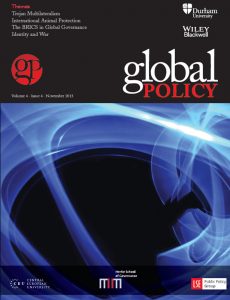Interview with Jon Gabe, Professor of Sociology, Royal Holloway University of London; Chair of Trustees of the Foundation for Sociology of Health & Illness

Jonathan Gabe is Professor of Sociology at Royal Holloway University of London, and the Chair of Trustees of the UK Charity, Foundation for Sociology of Health & Illness. In a recent interview, Jon spoke about his research, as well as the objectives and activities of the Foundation.
The Foundation Objectives
The Foundation for the Sociology of Health and Illness was established in December 1999 as a charity with the aim of promoting and improving social scientific research, education and scholarship in the field of the sociology of health and illness. The Foundation’s journal, Sociology of Health & Illness (SHI Journal), of which Jon is a previous editor, has been published since 1978, and publishes 8 issues a year including an annual special edition book series.
Discussing the Foundation’s objective to support the advancement of medical sociology in the UK, Jon discussed the various prizes and funds it awards: “our major funding priority is post doctorate researchers. The funding gives researchers time to write up their PHD for publication, either as a book or as journal articles. If they don’t have this time, quite often PHD students don’t publish, yet they have good data that should be published and which will make a contribution to the discipline.”
Another area of funding is in travel grants for researchers working on medical sociology papers, giving “a helping hand” towards the costs of attending conferences, as well as holding workshops and symposia, with the aim of bringing “people together into our network so they have an opportunity to meet, talk, and hopefully develop research grant applications, but at the very least create or reaffirm a network of people.”
This resonates with the words of Dr Kelley Sams, who in her previous blog post reflected on winning the Foundation’s 2017 Mildred Blaxter new writer’s prize, “Writing up research can be a lonely task. As students, we have our thesis advisers and professors to turn to, but as early career researchers, we must create our own networks of support. These networks can help us fight against internal doubts of legitimacy and help us see beyond our own internal struggles. Connecting with other researchers can also allow us to see that we are not alone in this rollercoaster of a career where one minute we are unable to type up coherent ideas, and the next we are winning a prize! […] Receiving recognition for our work, whether through a prize, acceptance for publication, or positive feedback, helps us to realize that despite these struggles, what we have to say is valuable.”
The Mildred Blaxter award is named after former editor of the SHI Journal, and is one of the initiatives Jon is most proud of. “Mildred Blaxter was a major contributor to the field and an excellent editor of the journal. The prize gives people the opportunity to develop a foothold in the academic community. Post-doctoral academic life has changed, and the expectations have increased, so if we can continue to offer at least two a year space to help post-doctoral researchers publish their work, then I think that is our major contribution to the future of the discipline.”
Research Projects
Jon’s own research into sociology of health and illness has been broad, including work on housing and overcrowding, mental health, drugs and tranquillisers, health care organizations and professions, and issues around consumption of healthcare and arguments around choice. “I’ve got a long standing interest in chronic illness, particularly around asthma in young people and how the decisions made about health care in clinics relates to participation in looking after asthma and health in a family context.” In a recent study in Ireland on experience of mild to moderate asthma, Jon described comparison of a group of middle-class young people, and a group of Irish travellers. “We asked them to choose pseudonyms for their interviews – the Irish travellers chose jockeys, the male middle-class kids chose Munster rugby club players, and the girls chose mainly film stars. Inhalers also became objects of consumerism, commodified with pictures and designs.”
Other ongoing projects amongst Jon’s PhD students include looking at epilepsy and diet in a family context, as well as a study on skin, “eczema, psoriasis, an interesting area that so far has very little work in sociology of health”.
Highlight research articles include:
- Gabe, J., Coveney, C. and Williams, S.J. (2016) ‘Prescriptions and Proscriptions: Moralising Sleeping Pills’. Sociology of Health and Illness (Accepted 5/9/15). Vol 38, No 4, 627-44. DOI: 10.1111/1467-9566.12383.
- Elston, M and Gabe, J. (2016) `Violence in general practice: a gendered risk? Sociology of Health and Illness Vol. 38, No. 3, 426-41 (published on line 26/10/15) DOI: 10.1111/1467-9566.12373
- Webster, M and Gabe, J. (2016) `Diet and identity: being a ‘good parent’ in the face of contradictions presented by the ketogenic diet’. Sociology of Health and Illness (published on line 18/9/15) Vol 38, No 1, 123-36. DOI:1111/1467-9566.12330.
Looking ahead
The discipline of the sociology of health and illness is constantly developing and being redefined. “There are areas like science and technology studies which some people have embraced and others are wary about. Some people don’t even think it’s sociology at all, yet there medical sociologists who are working across the boundaries of science and new technologies, biomedicine, genetics, and the digital”.
As to the Foundation, its work continues to shape the discipline “at the margins”. As Jon says “we don’t see it as our role to take the lead in guiding the development of the discipline. We’re a resource for others to take on that role, a force for others to help develop the discipline”.
SHI Journal publishes sociological articles on all aspects of health, illness, medicine and health care, and welcomes empirical and theoretical contributions in this field in the form of original research reports or review articles.
As selection of SHI Journal papers are available via the following links:
- Wright, J., Maher, J. and Tanner, C. (2015), Social class, anxieties and mothers’ foodwork. Sociol Health Illn, 37: 422–436. doi:10.1111/1467-9566.12202
- Grant, S., Ring, A., Gabbay, M., Guthrie, B., McLean, G., Mair, F. S., Watt, G., Heaney, D. and O’Donnell, C. (2015), Soft governance, restratification and the 2004 general medical services contract: the case of UK primary care organisations and general practice teams. Sociol Health Illn, 37: 30–51. doi:10.1111/1467-9566.12175
- Prins, S. J., Bates, L. M., Keyes, K. M. and Muntaner, C. (2015), Anxious? Depressed? You might be suffering from capitalism: contradictory class locations and the prevalence of depression and anxiety in the USA. Sociol Health Illn, 37: 1352–1372. doi:10.1111/1467-9566.12315
- Waring, J., Allen, D., Braithwaite, J. and Sandall, J. (2016), Healthcare quality and safety: a review of policy, practice and research. Sociol Health Illn, 38: 198–215. doi:10.1111/1467-9566.12391
To submit your article to Sociology of Health & Illness, please visit the author guidelines, here.






1530-2415/asset/SPSSI_logo_small.jpg?v=1&s=703d32c0889a30426e5264b94ce9ad387c90c2e0)
